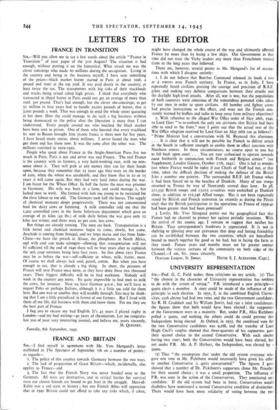LETTERS TO THE EDITOR
FRANCE IN TRANSITION Sist,—Will you allow me to say a few words about the article "France in Transition" of your paper of the 31st August? The situation is bad enough, without putting it on the fantastical. What struck me was the clever concierge who made 60 millions during the occupation. Living in the country and being in the business myself, I have seen something of the prices—black market butter started in Paris at about 'oaf. a pound and went at the top 500f. It was paid dearly in the country, at least twice the tax. The transporters with big risks of their truckloads and trucks being seized asked high prices. I think that everybody who transacted in illegal butter in Paris could not get an average of more than roof. per pound. That's bad enough, but the clever she-concierge, to get 50 million in four years had to handle 50,000 pounds of butter, that is 3,000 pounds a week. That was enough to send the whole street queueing at her 'door. How she could manage to do such a big business without being denounced to the police after the liberation is more than I can understand. Every people around me who touched the black market have been sent to prison. One of them who boasted that every truckload bc sent to Rouen brought him 50,000 francs is there now for five years.
I have heard many stories about millions. I never found the man who got them and has them now. It was the same after the other war. The millions vanished in 1919-1920.
People who speak about France in the Anglo-American Press live too much in Paris. Paris is not and never was real France. The real France is the country with its farmers, a very hard-working race, with no non- sense about it. They will grab at any money they can lay their hands upon, because they remember that 12 years ago they. were on the border of ruin, when the wheat was unsaleable, and they know that in to or i5 years it will come again. But they had very hard times during the war.
I am buyer for the Wheat Office. In half the farms the man was prisoner in Germany. His wife was born in a farm, and could manage it, but lacked men to work. She farmed with lads too young to be recruited for tho slave labour or too old. The Germans took half the horses. The supply of chemical manures drops progressively. There was not concentrated feed for dairy cows or fattening. A milk controller told me that the 1,200 controlled cows in the Seine Inferieure department which gave an average of 20 kilos (42 lbs.) of milk daily before the war gave only 12 kilos last winter, and there were 20 per cent, less cows.
But things are already turning. The men are back. Transportation is a little better and chemical manures begin to come, slowly, but come. Arachide is coming from Senegal, and we hope maize and rice from Indo- China—we have the potash in Alsace, the phosphates in North Africa, eV with coal can make nitrogen—allowing that transportation will not be sufficient till the end of 1946 there will be four years after to replenish the soil, crop rotations being here four years. So that about 1951 France may be as before the war—self-sufficient in wheat, milk, butter, meat. Of course we shall always lack coal, petrol, cotton. But when you have enough to eat, that is already a big thing. In short, the peasants of France will save France once more, as they have done these two thousand years. Their biggest difficulty will be to find workmen. Nobody will work in the country any more. Its quite impossible to find men to milk the cows, for instance. Now we have German p.o.w., but we'll have to import Poles or perhaps Italians, although it is a little too cold for them here. But one way or another they will muddle through. You may be think- ing that I am a little prejudiced in favour of our farmers. But I lived with them all my life, did business with them and know them. For me they are the best part of France.
I beg you to excuse my bad English. It's 45 years I played rugby in London—and my bad writing-4o years of rheumatism. Let me congratu- late you of your very interesting journal, and believe me, yours sincerely,
Fauville, 6th September, 1945. M. QUESNEY.


























 Previous page
Previous page